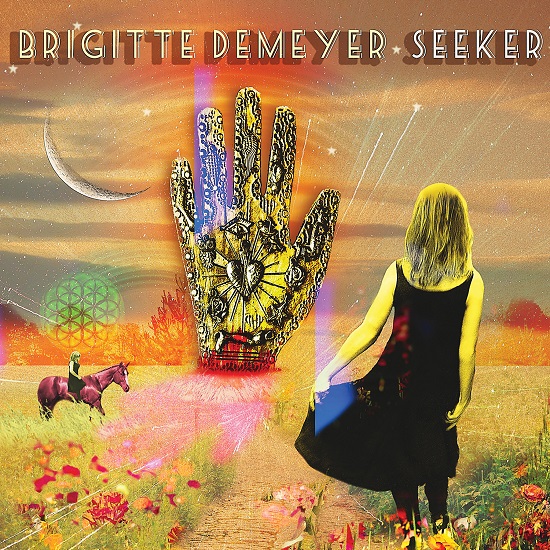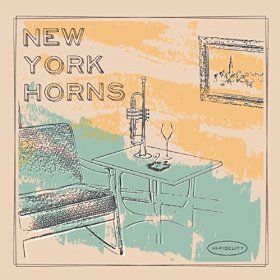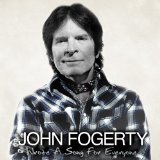
‘Learn something new every day’. Today’s was an absolute beauty; I discovered what a shuitar is. I won’t describe it because its creator, Jano Rix, does that in this piece of video:
Jano Rix is the co-writer for almost all of this album and plays percussion (including shuitar) and keyboards (including a bit of mellotron). However, the name on the sleeve, the voice (and what a voice it is) and the lived experience are very much Brigitte DeMeyer’s. There’s a little piece of pure invention here, but most of the songs are personal, whether that’s personal stories or personal viewpoints. The title’s appropriate, not just because of the song of that name but because there’s a strand of longing and melancholy running through its ten songs; longing for friends, longing for family, longing for truth and longing for familiar places.
But let’s start with the untypically humorous song because it links in neatly to the rest of the album. “Cat Man Do” has a loose jazz feel and a central character that could be the son (or grandson) of the Chuck E featured on Rickie Lee Jones’ first (and best-selling) single, “Chuck E’s in Love”. The song’s similar in style to the autobiographical “Ain’t No Mister” which also features a central character in the same mould as Chuck E; that’s jazzers for you. It’s difficult not to draw parallels between the vocal styles of Brigitte and Rickie Lee Jones; they can both sing with the delicacy of angels and produce a 4-packs-a-day growl when it’s needed.
The title song sounds like seventies Laurel Canyon, which is appropriate in a song about moving back to California and searching for truth, love and a friend or two. “Roots and Wings and Bones”, which follows “Seeker”, and closes the album, is a love song for Brigitte’s son, which might contain a little musical reference to “Bohemian Rhapsody” (or my imagination might be working overtime). The trilogy of very different love songs is completed by “Already In” for Brigitte’s husband and “Louisiana” (with a reference to the classic “Georgia On My Mind”) is about loving and missing New Orleans with an appropriate Big Easy arrangement and a few nods in the direction of Allen Toussaint.
It’s almost obligatory on an Americana album these days to have a political view or two; it’s a natural reaction to four turbulent years. The album’s laid-back opening song “All of the Blue” sings the praises of under-valued cowboys, while the bright honky-tonk of “Calamity Gone” skewers the politicians trying to claim spurious solidarity with working people. Yep, we know who they are and we have them in the UK as well; and I don’t see any swamps being drained on either side of the pond just yet.
“Seeker” is a fine piece of work. There’s plenty going on musically to keep the listener’s interest but it’s Brigitte’s highly personal lyrics that make the album a spiritual experience and privileged window into her life. And she also knows when to inject a bit of fun as well.
“Seeker” is released in the UK on Friday March 26th on BDM Records.
As a bonus, here’s a video shot for Bob Harris’s ‘Under the Apple Tree’ when Brigitte toured the UK with Will Kimbrough and Dean Owens in March 2017:
Update 02/03/21 – We’ve just discovered a video for the wonderful “Louisiana”:
 It’s relatively easy to record an album these days; you can do it at home or maybe in a studio and it won’t cost you the earth. You can organise your own distribution online or at live shows; you won’t get rich but you will get some return for your creativity. Not everything released by this route is good; there are way too many vanity projects, but occasionally something really worthwhile emerges. Sometimes a group of talented and like-minded musicians get together and just play the tunes they really want to play. If it makes a few dollars, that’s fine, but that’s not really the point because the musicians are playing the music they want to play and having a bit of fun with their own original material and a few covers. Very, very occasionally the result is an album packed with, superb performances and arrangements that you want to listen to again and again. “New York Horns” is one of those.
It’s relatively easy to record an album these days; you can do it at home or maybe in a studio and it won’t cost you the earth. You can organise your own distribution online or at live shows; you won’t get rich but you will get some return for your creativity. Not everything released by this route is good; there are way too many vanity projects, but occasionally something really worthwhile emerges. Sometimes a group of talented and like-minded musicians get together and just play the tunes they really want to play. If it makes a few dollars, that’s fine, but that’s not really the point because the musicians are playing the music they want to play and having a bit of fun with their own original material and a few covers. Very, very occasionally the result is an album packed with, superb performances and arrangements that you want to listen to again and again. “New York Horns” is one of those.
So, who are the New York Horns? Well the horn players are Chris Anderson (trumpet and flugelhorn), John Isley (tenor and baritone sax and bass clarinet) and Neal Pawley (trombone and vocals) and they’re better known as the horn section of Southside Johnny the Asbury Jukes. Here they’re aided and abetted by fellow-Jukes Jeff Kazee (piano, Hammond B3, keys and vocals) and Glenn Alexander(guitars, dobro, mandolin and vocals) and a rhythm section of Shawn Pelton (drums and percussion) and Tony Tino (electric bass).
The album opens with a very different instrumental take on KT Tunstall’s breakthrough song “Black Horse & the Cherry Tree”. Where the original builds gradually by using a loop pedal for instrumental and vocal parts, the NYH version comes in, after a quick guitar intro, at full strength with Latin American percussion (courtesy of Marc Quinones) and perhaps a hint of early Santana. Chris Anderson’s tone poem “Morningside at Midnight” is next, taken at a walking tempo, and evoking the spirit of Morningside Heights with electric piano, wah-wah guitar and unison sax and trumpet. The Hank Williams classic “Hey Good Lookin’” is the first vocal piece, driven along by a guitar riff and horn fills before the sax, guitar and Hammond solos kick in. “Song for Levon”, a Chris Anderson and John isley co-write is a tribute to Levon Helm. It’s stately and mournful in classic New Orleans tradition and features Southside Johnny as guest harmonica player.
The uptempo jazz-funk of John Isley’s “Little Miss Thing” wouldn’t sound out of place on either of Donald Fagen’s first two solo albums and features the first trombone solo on the album from Neal Pawley; it’s great fun. “Can’t Stand to See You Cry”, written and sung by Jeff Kazee, is a powerful soul song with a superb plaintive vocal and an arrangement that Allen Toussaint would be proud of while “Strollin’ With Sean” is a fairly straightforward blues driven along by a horn riff and it’s another chance for the guys to solo for all they’re worth and have a great time. The final cover on the album is John Hiatt’s “Little Head” which retains the feel of the original while adding punch with horn fills.
John Isley’s “78 Below” opens with an uptempo Nile Rodgers –style lead/rhythm riff which, with the punchy bass, drives the piece along underneath a staccato muted trumpet melody before the mood mellows again with Chris Anderson’s “More Than Tears”. Opening with a restrained combination of piano, acoustic guitar and mandolin, this moody and melancholic piece is perfect for the flugelhorn which Chris uses to carry the main melody. John Isley’s “Under the Hood” is an atmospheric piece using Hammond and the horn ensemble to create the mood and features a muted trumpet solo from Chris Anderson. The album’s closing song, “Nothing Left to Say”, opens slowly in New Orleans jazz funeral style, with a guest vocal by Christine Ohlman before erupting just before the halfway mark into uptempo New Orleans jazz with trumpet and sax counterpoint. There’s also a lyrical message here which underpins the whole album; however bad things get, there’s always music to pull you back, whether you play it or listen to it. It’s a perfect way to close the album.
The beauty of this album is that it was made because the musicians involved really wanted to make it. They had a lot of ideas and they wanted to get those ideas out there to people who might want to hear them. It’s not about focus groups or marketing teams; it’s about strong, sometimes very personal, material arranged well and played superbly. If you need to label it, I suppose it’s jazz, but it also pushes out in other directions as well, towards funk and old school soul; there’s certainly plenty of variety on display. Check out some of the song links here and think seriously about buying yourself a copy, if only to let a bunch of great musicians know that some people out there are actually getting the message.
Available now from Amazon and iTunes.
 So, what’s this all about then? John Fogerty, former Creedence Clearwater Revival frontman and highly respected solo artist has decided to revisit some of his back catalogue with a few collaborators and throw in a brace of new songs for good measure. It’s not a new idea and it can be either a cynical attempt to cash in on a few good, old songs or a chance to invite fellow musicians to put their stamp on your songs. I’m really pleased to say that “Wrote a Song for Everyone” is a fascinating look at the heritage of one of the great rock songwriters and performers. You have to approach this with an open mind; some of the songs, in their original incarnations, were massive teenage favourites of mine through happy and sad times but there are some radically different interpretations here. The conventional view is that Eagles popularised the country-rock genre, but you could make the same case for Creedence if you take your country influences from New Orleans rather than Bakersfield; just a thought.
So, what’s this all about then? John Fogerty, former Creedence Clearwater Revival frontman and highly respected solo artist has decided to revisit some of his back catalogue with a few collaborators and throw in a brace of new songs for good measure. It’s not a new idea and it can be either a cynical attempt to cash in on a few good, old songs or a chance to invite fellow musicians to put their stamp on your songs. I’m really pleased to say that “Wrote a Song for Everyone” is a fascinating look at the heritage of one of the great rock songwriters and performers. You have to approach this with an open mind; some of the songs, in their original incarnations, were massive teenage favourites of mine through happy and sad times but there are some radically different interpretations here. The conventional view is that Eagles popularised the country-rock genre, but you could make the same case for Creedence if you take your country influences from New Orleans rather than Bakersfield; just a thought.
The album opens with “Fortunate Son”, which is amped-up by the Foo Fighters to a full-on rocker (no surprise there) before Keith Urban delivers a banjo-led country-rock version of “Almost Saturday Night” which takes the song back to its lyrical roots and “Lodi” (probably my favourite John Fogerty song) gets the Status Quo “Rocking All Over the World” treatment with John’s two sons Shane and Tyler Fogerty. Incidentally, this is the only collaboration that Fogerty arranged, pulling rank with his two sons when he didn’t like their country-rock arrangement. “Mystic Highway” is one of the new songs and breaks down into 3 sections, the main song, an instrumental section and an a capella breakdown with a strong feel of the Doobie Brothers “Black Water”. “Wrote a Song for Everyone” features a Miranda Lambert vocal and some exceptional guitar work from Tom Morello; so far so good.
The Zac Brown Band reworking of “Bad Moon Rising” in a Cajun style works less well for me, losing the brooding menace of the original version. “Long as I can See the Light” with My Morning Jacket sticks fairly close to the original, retaining the organ riff which characterises that version and is followed by Kid Rock’s take on “Born on the Bayou”. Apparently it’s now a violation of several federal statutes to record a collaboration album without including a Kid Rock track. The album’s second new song “Train of Fools” follows, exploring similar territory to Springsteen’s recent “Land of Hope and Dreams”. It’s obvious that John Fogerty can still write a good song and the new songs sit very comfortably alongside his earlier work on this album.
“Someday Never Comes” with Dawes has Taylor Goldsmith singing the verses about the things we tell kids (and adults) to shut them up while Fogerty takes the choruses as the gruff old bad guy who tells us that it’s all lies. Bob Seger delivers the Woodstock song “Who’ll Stop the Rain” very much in the style of his 1976 classic “Night Moves”, which works very well. If any singles are to be released from the album, “Hot Rod Heart” should be top of the list. It’s a great driving song (maybe it’s time we had an alternative to the lazy radio programming of Don Henley’s “The Boys of Summer” every time the sun shines for more than five minutes) and the last couple of minutes consists of Fogerty and Brad Paisley trading superb guitar solos and generally having a good time. I bet Paddy McAloon wouldn’t like it.
“Have You Ever Seen the Rain” with Alan Jackson works perfectly with a pure country arrangement with banjo, fiddle and steel guitar filling out the sound and leads us into the last track of the album. I’ve heard many versions of “Proud Mary”, but nothing quite like this. The first verse and chorus are pure gospel with Jennifer Hudson backed by a gospel choir and the wonderful Allen Toussaint before speeding up to a Cajun boogie with the full band and accordion and horns for good measure. I used to think the Ike & Tina Turner version was over the top, but they only used one kitchen sink and I think there’s about three here. It’s a glorious way to end a great album.
John Fogerty has survived in the music business for a long time with all of the usual peaks and troughs that anyone big in the sixties and seventies went through including the publishing disputes, particularly the publishing disputes. The reason he’s still around is that he loves what he does and he’s very good at it. “Wrote a Song for Everyone” is a very, very good album.
Out now on Vanguard (88765487152).


